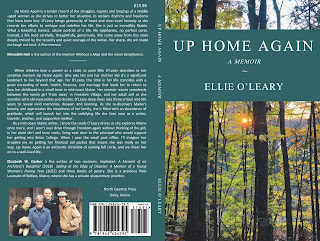Ars Poetica
For some of us, or for some of our elders, Sundays often included Latin. I don’t really know if that is how I ended up putting this form on a Sunday, but here we are discussing ars poetica – poetry about poetry. This is not a form in itself but, like the occasional poem, it’s descriptive. You could write a sonnet or even a limerick about poetry and that would be an example of ars poetica.
The original ars poetica, “The
Art of Poetry” was writing by the poet Horace around 20 to 18 BCE and was among
his last works. It consists of 476 lines and offers lots of practical advice on
the art, or the craft, of poetry to young poets. Your poem can be considerably
shorter and mention just about anything about poetry.
Poetry Marianne Moore
(The formatting, particularly
line breaks, is inconsistent in versions I found online. Perhaps that helps to
prove her point.)
I too,
dislike it: there are things that are important beyond all this fiddle.
Reading it, however, with a perfect contempt for it, one
discovers that there is in
it after all, a place for the genuine.
Hands that can grasp, eyes
that can dilate, hair that can rise
if it must, these things are important not because a
high-sounding interpretation can be put upon them but
because they are
useful; when they become so derivative as to become
unintelligible, the
same thing may be said for all of us—that we
do not admire what
we cannot understand. The bat,
holding on upside down or in quest of something to
eat, elephants pushing, a wild horse taking a roll, a
tireless wolf under
a tree, the immovable critic twinkling his skin like a
horse that feels a flea, the base—
ball fan, the statistician—case after case
could be cited did
one wish it; nor is it valid
to discriminate against “business documents and
school-books”; all these phenomena are important. One
must make a distinction
however: when dragged into prominence by half poets, the
result is not poetry,
nor till the autocrats among us can be
“literalists of
the imagination”—above
insolence and triviality and can present
for inspection, imaginary gardens with real toads in
them, shall we have
it. In the meantime, if you demand on the one hand, in
defiance of their opinion—
the raw material of poetry in
all its rawness, and
that which is on the other hand,
genuine, then you are interested in poetry.
Ars Poetica? Czeslaw Milosz , translated by Czeslaw Milosz and Lillian Vallee
I have always aspired to a more spacious form
that would be free from the claims of poetry or prose
and would let us understand each other without exposing
the author or reader to sublime agonies.
In the very essence of poetry there is something indecent:
a thing is brought forth which we didn’t know we had in us,
so we blink our eyes, as if a tiger had sprung out
and stood in the light, lashing his tail.
That’s why poetry is rightly said to be dictated by a daimonion,
though it’s an exaggeration to maintain that he must be an angel.
It’s hard to guess where that pride of poets comes from,
when so often they’re put to shame by the disclosure of their frailty.
What reasonable man would like to be a city of demons,
who behave as if they were at home, speak in many tongues,
and who, not satisfied with stealing his lips or hand,
work at changing his destiny for their convenience?
It’s true that what is morbid is highly valued today,
and so you may think that I am only joking
or that I’ve devised just one more means
of praising Art with the help of irony.
There was a time when only wise books were read,
helping us to bear our pain and misery.
This, after all, is not quite the same
a s leafing through a thousand works fresh from psychiatric clinics.
And yet the world is different from what it seems to
be
and we are other than how we see ourselves in our ravings.
People therefore preserve silent integrity,
thus earning the respect of their relatives and neighbors.
The purpose of poetry is to remind us
how difficult it is to remain just one person,
for our house is open, there are no keys in the
doors,
and invisible guests come in and out at will.
What I'm saying here is not, I agree, poetry,
as poems should be written rarely and
reluctantly,
under unbearable duress and only with the hope
that good spirits, not evil ones, choose us for their instrument.
My own example, previously published in Ibbetson Street Magazine
That Poetry Thing
I.
Why
You may wonder why I bother,
You may ask - Poetry you say?
You may tell me you don’t do that.
You tell me you don’t have that,
that poetry thing.
That’s my job, I tell you,
I’ll take the responsibility
to organize the thoughts and the hopes,
into stanzas, into lines, for
that poetry thing.
II.
What
I write the threads connecting the
stars
I write the primeval password
I tell the prophecies to you
I can only hope you’ll take in
that poetry thing.
That’s my job, I tell you, I write
the voices that are not heard.
I organize the prophecies
and take responsibility for
that poetry thing.
III.
To Whom
Who listens? – You ask me, smirking.
Who would care?
Who would read these things?
Who would even see this,
this poetry thing?
It’s written and that is enough.
It’s there, like bread, for everyone
Available, like communion,
Partaken or not, we have
this poetry thing.

Comments
Post a Comment